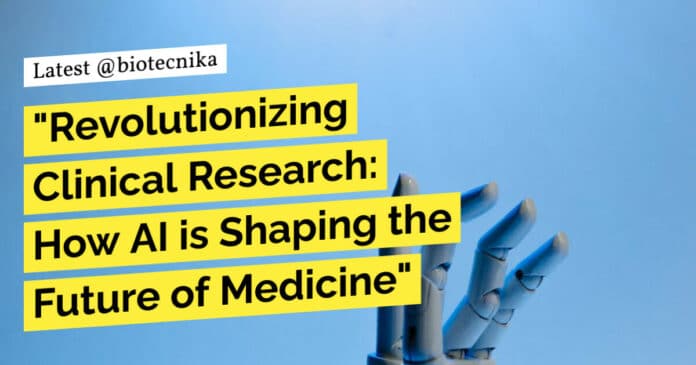AI & Future of Medicine – Emerging Role of AI in Medical Progress: Present and Future Perspectives
The integration of Artificial Intelligence (AI) and Machine Learning (ML) into clinical studies is ushering in an era dominated by algorithm-based medical breakthroughs. The current progress, regulatory shifts, and potential of AI in this field are molding the future paths of drug creation and healthcare delivery.
Understanding the Regulatory Landscape
The U.S. Food and Drug Administration (FDA) acknowledges the revolutionary role of AI in the medical sector. In 2023, the FDA released a document detailing present and forthcoming uses of AI/ML in medicine’s developmental phase. It touched upon pivotal aspects like human oversight, data reliability, and standards for creating models, accentuating a method that weighs risks and is adaptable to the specific AI/ML contexts. It accentuates the essence of responsibility and clarity.
Moreover, a congressional review led by Senate Majority Leader Schumer is in motion to carve a new set of AI rules in healthcare. This initiative seeks the wisdom of AI specialists to balance innovation with governance. Recent congressional discussions saw the participation of tech leaders like Mark Zuckerberg from Meta and others, with Elon Musk remarking on the grave implications of
AI missteps.Data’s Central Role in Medical AI
Data functions as the backbone of AI in clinical exploration, with its volume expanding at a remarkable pace. To give a perspective, standard Phase III clinical trials produce around 3.56 million data points, as reported by Tufts. The projection for medical data is to multiply almost fivefold annually, underscoring the imperative for proficient data handling and interpretation.
The enormity of the value data carries is apparent, but it’s also essential to process this raw data. To harness its true potential, we must sift through it using advanced analytics and algorithms. Given the overwhelming amount of data, leveraging AI becomes indispensable.
Immediate AI Contributions
Currently, AI is playing a transformative role in clinical studies by:
- Data Analysis: With AI, massive data sets are becoming more navigable, revealing insights that might have stayed concealed.
- Documentation: Through AI, the recording and tabulation of patient data have been made more streamlined, easing the workload of medical staff.
A Glimpse into the Future
The horizon looks promising for AI in clinical studies:
- Regulation and Compliance: AI might fast-track processes like IND submissions, hastening the rollout of novel medical solutions.
- Study Design: Generative AI tools can swiftly draft study blueprints based on a plethora of sources like past trials and medical literature.
- Patient-Trial Alignment: Enhanced AI algorithms can better match patients to relevant clinical studies, leading to improved success rates.
- Safety Projections: AI’s predictive capacities can forewarn about potential hazards, possibly preventing unfavorable outcomes.
- Digital Replicas: AI can fabricate and monitor virtual patient models, offering insights into individual health conditions. These digital models have potential applications in predicting responses based on bio-signatures in both the realms of clinical testing and drug creation.
FDA’s Risk Evaluation Strategy
FDA’s strategy for AI in clinical studies evaluates the relevance of information provided by Software as a Medical Device (SaMD) and the state of the healthcare scenario. This strategy delves deep into aspects like the influence of a model and the implications of its decisions, emphasizing model reliability in its intended use.
AI’s Potential and Real-World Applications
AI is poised to introduce transformative changes in drug creation:
- Patient Profiling & Alignment: AI, when empowered by diverse data sources, can construct comprehensive patient portfolios, facilitating precise alignment of patients with relevant clinical studies. This not only makes the selection process efficient but also refines the data quality, leading to tailored treatments and better patient outcomes.
- Documenting Regulations and INDs: AI’s potential extends to streamlining the creation of comprehensive regulatory documents. By delving into copious amounts of existing resources and literature, AI can amalgamate crucial information, ensuring both speed and quality.
- Drafting Study Blueprints: AI can accelerate the foundational stages of clinical studies by swiftly creating study outlines based on vast internal data and research literature.
- Post-Approval Monitoring: AI remains integral even after clinical trials, especially in monitoring safety and treatment efficiency. AI tools are adept at identifying potential risks and evaluating drug efficacy based on real-world evidence.
- Digital Twins in Predictive Analysis: AI’s capacity to create patient “digital twins” is a pivotal development. By testing virtual scenarios, researchers can predict individualized treatment outcomes, heralding an era of truly personalized medical care.
To conclude, AI’s melding with clinical studies is reshaping how we understand drug development, patient care, and regulatory processes. As the volume of data surges, AI’s role in refining and understanding it becomes even more crucial. Medical professionals and stakeholders should remain vigilant, adapting to these shifts and readying themselves for a future where AI leads the way in clinical research.
Key Terms: AI & Future of Medicine, AI in Medicine’s Future, Clinical Study AI, Machine Learning, Data Interpretation, Regulatory Compilation, IND Processes, Patient Alignment, Predictive Safety, Digital Replicas, FDA, Tailored Medical Care.



























